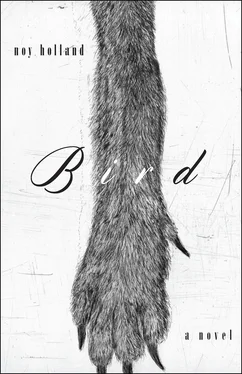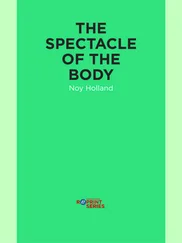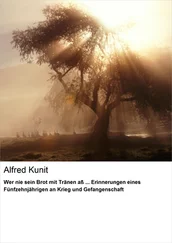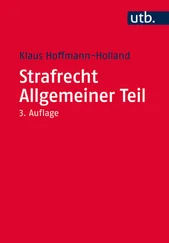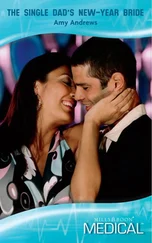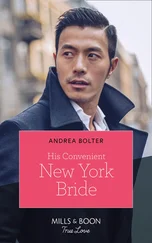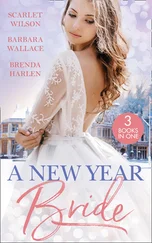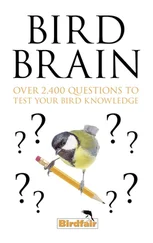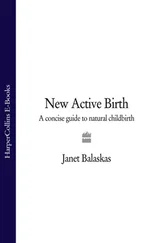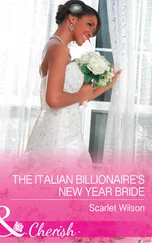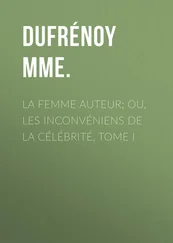The day passing. Pfft!
She goes through the Family Album, the snapshots buckled and blotchy between the plastic sleeves. They are orderly, chronological; she has sorted them some by color. Not the old life, but the new. Not the wedding, even, but the babies. Everything else is loose — Bird as a kid among horses, the snapshot of Mickey’s dog. The picture she took of Tuk and Doll Doll, Doll Doll on the hood of the Ryder truck with bobby pins in her hair. Her legs bloodied. Her belly rounding up under her culotte.
A mess. The passing of years unrecorded — but Bird records them now.
This then this then this then this. Turns the page.
She finds the one of her boy at Coney Island, the aquarium there beside the sea. Belugas turning circles in the murk, the tank Lucite so they can see.
“They are watching a movie of us and we are watching a movie of them and everybody’s happy,” her boy had said.
And it was true, or could seem to be true: the whales had smooth impish faces. They were at play, smiling through the murk, coming around again.
They were never going to get very good at that part, Mickey and Bird weren’t: at coming around again. Not at once, she thinks, not together. Not a movie to take your children to, nothing to show your ma: the little gougings, the wreck of the way they lived.
Hot blue bramble of welder’s sparks. A boat passing. Everything is blue.
Pretty yourself how you used to, Bird. I’ll take you back to Paris. I’ll take you to Timbuktu.
Bird slips her hand between her legs and sees his face again. So quick the heat, sweet wandering star that blasts apart in her head.
But something’s ringing.It’s the phone.
Let it go. It rings again.
That will be Suzie, Bird thinks, but it isn’t. It’s the vet with his friendly reminder: the dog is due for Parvo, Lyme’s, the whole panel, DTP.
“Can’t get there,” Bird tells him, “no car.”
A lie. Because who strings flowers around roadside oaks dizzy mothers slam the family car into, driving drunk with their babies at noon?
“As you wish,” says the vet. “But she’s due. Overdue, actually. I showed you the heart with the heartworm, yes?”
“Oh yes,” says Bird. “Awful.”
And hangs up.
The dog is gazing at her with its milky eyes. A good old dog, a layabout. You can forget she is even here. She’ll die quietly, Bird wagers, beside the woodstove, considerate to the end. Bird will have time to dig a grave for her before the kids scrabble off the school bus; she will chink words into her headstone: Never to Walk in Sunshine Again.
For now the dog burns her tail calmly against the buckled wall of the woodstove: dog of their New England hills. Of their quieting life — no Maggie.
Maggie made herself known every minute. She pawed at your feet if you forgot her.
Maggie jumped up to take down Bird’s hair. She hooked the hair band with her eyetooth, snuffling, tugged the band free and stood there rolling it in her mouth. You couldn’t talk with that dog. How they said it: You can’t have a conversation with that dog. She whimpered and paced and stewed.
Poor Maggie.
Gone But Not Forgotten.
I Was out Getting Drunk with You.
Mickey took tosleeping through the morning. He fell off the bed and kept sleeping through the brief green afternoons.
He would come around, Bird thought, he had to. Give him a little time.
Give him time. Given time. Give me time. Forgive me time.
Amend me my misliving .
He quit touching her. It was all he could do to look at her.
“I seem to suffer too much. I can’t say why.”
The chair Mickey smashed into pay phones the night they found Maggie hanged from the heating duct, Bird kindled stick by stick in the bathtub. They burned what was left of the books they had read. Books they hadn’t.
Bird fished in a wind for garbage to burn, from the stream blown down their street. On a frozen wad of newsprint, a street collage, among the usual ads — Biggie Size your Coke ( piggie is what her boy says, You want to Piggie Size your Coke? ), the gimme sheets, the gotcha, the Last Days, Everything Must, Any Midwinter American Meal, was an ad for getting out. Gas money, hotel nights. They would pay you, even, to do it — to drive a Drive Away out.
Bird came inside from the brace of cold and shook Mickey awake and kissed him. Brought him his steaming coffee. It wouldn’t matter where they went.
Of course it would. Bird wanted sunshine, a generous sky. She wanted to see the monument of Crazy Horse, his arm as long as twelve elephants, thrust out over the plains.
“What do you think?” she asked Mickey.
He thought nothing.
“We can’t stay here,” Bird said. “We have nothing to eat. The toilet froze.”
The baby was as big as a walnut now, as a tiny frog, slow in the cold.
He wouldn’t budge.
Love. Love was impossible.
“I have a narrowing sense of joy and somehow I blame you,” he allowed.
At that, Bird left the bedroom and the bit of heat it offered. She sat on the floor in the kitchen and stroked the newspaper smooth to read. She picked through last year’s leaves, dismissed by the trees, a few still supple and red. She found a bone, bitten clean, and she bit it. She found her wad of curls shorn from Hasidim boys and picked one out to ransom.
They were killing each other. She could see that. She would have to save herself and go.
But Bird was better at staying than going. She could conjure every sweetness still — it was all tucked away in her head.
One last time, she thought — and got right into bed. She kissed him everywhere she could think to. She licked him between his toes. She breathed into the loops and channels of his ears. She wore him down, in short, with every tenderness that was hers to summon.
They slept afterwards and dreamed the same dream, which is one of the gifts we are given when we are sharp enough to know. They slept touching, and the dream-story shuttled between them, reckoning by friendly stars. The moon passed its light through the window.
It was the light of the moon Bird saw by when she waked, mercifully dim and blue. She waked screaming. A corkscrew was turning in her navel, how it felt, and their bed was soggy with blood.
Mickey didn’t wakeright away; she had to shake him. Their phone was cut off so they bundled Bird in the dog’s old hairy blanket and went down the stoop into the street. The blood kept coming, pleasant almost, warm at least, for a minute. She wished he would carry her, but this was silly. The bodegas were closed, the pay phones smashed. There was hardly a car on the street. At last a cabbie stopped, took a look at Bird, and peeled off.
By the time they got to the ER, Bird was shaking with cold and delirious. Mickey had tried to carry her. Blood was matted in his hair, streaked across his face, across Bird’s face, the mark of the dream they shared. Bird whimpered and talked to her mother. She wouldn’t talk to Mickey or look at him. The room flew up if she looked at him and whipped around her head.
They knocked Bird out to finish up with it, the old D & C, the flush and suck, dilatation, curettage, good to go, up and out. She could have watched if she had wanted but she didn’t. Mickey walked her in in her paisley shift, in stages helped her lie down. A gentle man, good to her. Loving of the lesser animals, good to her and kind.
They would find a way to speak of it. He would tell her in bits when she wanted to hear and stop should she ask and she didn’t. She waked and slept and when she waked at last, the day was lifting and blue. She kept her head turned away and said nothing. The sun blazed through the murky window and blotted out the room.
Читать дальше
